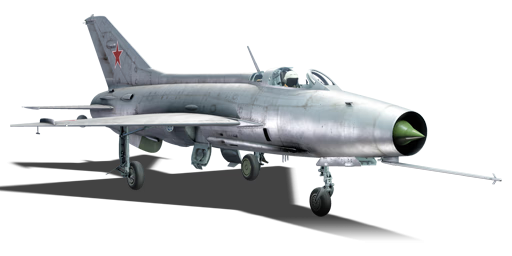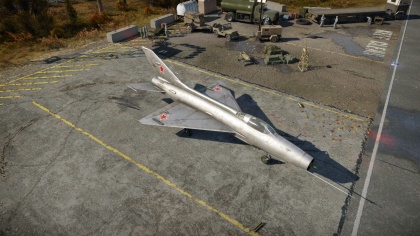Difference between revisions of "MiG-21F-13"
(→History) (Tag: Visual edit) |
(Edits.) |
||
| Line 132: | Line 132: | ||
== History == | == History == | ||
| − | The MiG-21 series of planes would become the most widely-used family of fighter jets in the world, with over 4,000 produced, including license-built copies in China, India and Czechoslovakia. The roots of this highly successful combat aircraft started in the mid-1950s, with the Soviet desire to create a Mach-2 capable light fighter. The first MiG-21F prototypes were presented at the Tushino air show in June | + | <!--''Describe the history of the creation and combat usage of the aircraft in more detail than in the introduction. If the historical reference turns out to be too long, take it to a separate article, taking a link to the article about the vehicle and adding a block "/History" (example: <nowiki>https://wiki.warthunder.com/(Vehicle-name)/History</nowiki>) and add a link to it here using the <code>main</code> template. Be sure to reference text and sources by using <code><nowiki><ref></ref></nowiki></code>, as well as adding them at the end of the article with <code><nowiki><references /></nowiki></code>. This section may also include the vehicle's dev blog entry (if applicable) and the in-game encyclopedia description (under <code><nowiki>=== In-game description ===</nowiki></code>, also if applicable).''--> |
| + | |||
| + | The MiG-21 series of planes would become the most widely-used family of fighter jets in the world, with over 4,000 produced, including license-built copies in China, India and Czechoslovakia. The roots of this highly successful combat aircraft started in the mid-1950s, with the Soviet desire to create a Mach-2 capable light fighter. The first MiG-21F prototypes were presented at the Tushino air show in June 1956, and deliveries started in 1958. The model, "Fishbed C" in NATO parlance, was widely exported. In the Soviet Union, it was replaced by the MiG-21PF model after 1961. | ||
== Media == | == Media == | ||
Revision as of 10:13, 18 September 2019
Contents
Description
The MiG-21F-13 is a rank VI Russian jet fighter
with a battle rating of 8.7 (AB), 9.3 (RB), and 9.7 (SB). It was introduced in Update 1.91 "Night Vision".
General info
Flight performance
Describe how the aircraft behaves in the air. Speed, manoeuvrability, acceleration and allowable loads - these are the most important characteristics of the vehicle.
| Characteristics | |||||||
|---|---|---|---|---|---|---|---|
| Stock | |||||||
| Max Speed (km/h at 13,000 m) |
Max altitude (meters) |
Turn time (seconds) |
Rate of climb (meters/second) |
Take-off run (meters) | |||
| AB | RB | AB | RB | AB | RB | ||
| ??? | ??? | 16000 | ??.? | ??.? | ??.? | ??.? | 750 |
| Upgraded | |||||||
| Max Speed (km/h at 13,000 m) |
Max altitude (meters) |
Turn time (seconds) |
Rate of climb (meters/second) |
Take-off run (meters) | |||
| AB | RB | AB | RB | AB | RB | ||
| ??? | ??? | 16000 | ??.? | ??.? | ??.? | ??.? | 750 |
Details
| Features | ||||
|---|---|---|---|---|
| Combat flaps | Take-off flaps | Landing flaps | Air brakes | Arrestor gear |
| ✓ | ✓ | ✓ | ✓ | X |
| Limits | ||||
|---|---|---|---|---|
| Wing-break speed (km/h) |
Gear limit (km/h) |
Combat flaps (km/h) |
Max Static G | |
| + | - | |||
| 550 | ~11 | ~5 | ||
| Optimal velocities | |||
|---|---|---|---|
| Ailerons (km/h) |
Rudder (km/h) |
Elevators (km/h) |
Radiator (km/h) |
| < 650 | < 600 | < 780 | N/A |
| Compressor (RB/SB) | ||
|---|---|---|
| Setting 1 | ||
| Optimal altitude | 100% Engine power | WEP Engine power |
| 0 m | 3,350 kgf | 5,025 kgf |
Survivability and armour
Examine the survivability of the aircraft. Note how vulnerable the structure is and how secure the pilot is, whether the fuel tanks are armoured, etc. Describe the armour, if there is any, and also mention the vulnerability of other critical aircraft systems.
Armaments
Offensive armament
Describe the offensive armament of the aircraft, if any. Describe how effective the cannons and machine guns are in a battle, and also what belts or drums are better to use. If there is no offensive weaponry, delete this subsection.
Suspended armament
Describe the aircraft's suspended armament: additional cannons under the wings, bombs, rockets and torpedoes. This section is especially important for bombers and attackers. If there is no suspended weaponry remove this subsection.
Defensive armament
Defensive armament with turret machine guns or cannons, crewed by gunners. Examine the number of gunners and what belts or drums are better to use. If defensive weaponry is not available, remove this subsection.
Usage in battles
Describe the tactics of playing in the aircraft, the features of using aircraft in a team and advice on tactics. Refrain from creating a "guide" - do not impose a single point of view, but instead, give the reader food for thought. Examine the most dangerous enemies and give recommendations on fighting them. If necessary, note the specifics of the game in different modes (AB, RB, SB).
Pros and cons
Summarise and briefly evaluate the vehicle in terms of its characteristics and combat effectiveness. Mark its pros and cons in the bulleted list. Try not to use more than 6 points for each of the characteristics. Avoid using categorical definitions such as "bad", "good" and the like - use substitutions with softer forms such as "inadequate" and "effective".
Pros:
- Great top speed
- Has access to air-to-air missiles
- Hard-hitting 30 mm cannon
- Decent manoeuvrability at high speeds
- Great rate of climb
- Fairly small target
Cons:
- Low-speed manoeuvrability is not very good
- Only one gun
- Measly 60 rounds of ammo; you must make every shot count
- Quirky rudder characteristics
- Missiles have a short lock-on range
- Can exceed wing rip speed (1,300 kph) in level flight
History
The MiG-21 series of planes would become the most widely-used family of fighter jets in the world, with over 4,000 produced, including license-built copies in China, India and Czechoslovakia. The roots of this highly successful combat aircraft started in the mid-1950s, with the Soviet desire to create a Mach-2 capable light fighter. The first MiG-21F prototypes were presented at the Tushino air show in June 1956, and deliveries started in 1958. The model, "Fishbed C" in NATO parlance, was widely exported. In the Soviet Union, it was replaced by the MiG-21PF model after 1961.
Media
Excellent additions to the article would be video guides, screenshots from the game, and photos.
See also
Links to the articles on the War Thunder Wiki that you think will be useful for the reader, for example:
- reference to the series of the aircraft;
- links to approximate analogues of other nations and research trees.
External links
Paste links to sources and external resources, such as:
- topic on the official game forum;
- encyclopedia page on the aircraft;
- other literature.
| USSR jet aircraft | |
|---|---|
| Bereznyak-Isayev | BI |
| Yakovlev | Yak-15 · Yak-15P · Yak-17 · Yak-23 · Yak-28B · Yak-30D · Yak-38 · Yak-38M · Yak-141 |
| Mikoyan-Gurevich | MiG-9 · MiG-9 (l) · MiG-15 · MiG-15bis · MiG-15bis ISh · MiG-17 · MiG-17AS · MiG-19PT |
| MiG-21F-13 · MiG-21PFM · MiG-21S (R-13-300) · MiG-21SMT · MiG-21bis | |
| MiG-23M · MiG-23ML · MiG-23MLD · MiG-27M · MiG-27K | |
| MiG-29 · MiG-29SMT | |
| Lavochkin | La-174 · La-15 · La-200 |
| Sukhoi | Su-9 · Su-11 |
| Su-7B · Su-7BKL · Su-7BMK · Su-17M2 · Su-17M4 · Su-22M3 | |
| Su-24M | |
| Su-25 · Su-25BM · Su-25K · Su-25T · Su-25SM3 · Su-39 | |
| Su-27 · Su-27SM | |
| Su-34 | |
| Ilyushin | IL-28 · IL-28Sh |
| Tupolev | Tu-14T |





